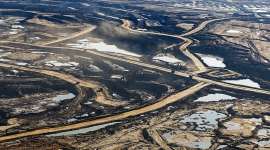"It is wrong for UBC to continue to profit from its investments in fossil fuel companies," faculty says
"We are inspired by our students, who voted overwhelmingly in favour of divestment earlier this year," said UBC professor.
We are asking for UBC to immediately forgo further investments in fossil fuel companies, and divest from all existing fossil fuel holdings within five years. Action on climate change requires a rapid transformation of our energy system away from fossil fuels, and divestment can help promote this.
Some are concerned divestment might hurt the income UBC receives from the endowment, but this need not to be the case. There are many opportunities in the market for an endowment to make equivalent or better returns, and studies designed to measure the impact of divestment have found little or no impact on returns.[iv] Indeed, there are increasing concerns that a “carbon bubble” could pose significant financial risks to investments in fossil fuels.[v] As a result, divestment is consistent with UBC’s duties as a trustee. We call on UBC to use the endowment as a living laboratory: design a profitable fossil free portfolio, and use it as a model to inspire sustainable investing behaviour at other institutions. We recognize this will be a complex and challenging task, which is why we have included a five-year timeline for full divestment.
Some are concerned this may hurt the university’s ability to raise money through private donations. We believe that demonstrating a strong commitment to sustainability and becoming a global leader in combating climate change can help UBC attract additional donations and funding.
Some would prefer UBC to maintain ownership and exercise leverage as a shareholder. Because the business model of fossil fuel companies is so reliant on carbon reserves that humanity can’t afford to burn, working through shareholder channels simply is inadequate to achieve the transformative changes required. These urgent times demand rapid and significant changes in our energy system, and we believe those changes would be better fostered through the more dramatic action of divestment. Moreover, divestment calls attention to the pollution of politics fostered by the fossil fuel industry, including campaigns to mislead the public about climate science, as well as efforts to block, dilute, or delay the adoption of meaningful climate policies.[vi]
Some are concerned that we need fossil fuels to live and thrive. This is no doubt true in the short term, which is why we advocate a shift to a clean energy economy, something engineers, scientists, and economists have concluded is both achievable and affordable. By divesting, UBC can show leadership in fostering this necessary transformation.
Some have questioned the efficacy of divestment as a strategy. In addition to highlighting the fossil fuel industry’s role in perpetuating carbon pollution and political pollution, divestment can reduce a company’s stock price, pressuring companies to shift their investment to clean energy such as wind and solar power.[vii] A single divestment campaign won’t make a difference; that’s why we’re part of hundreds of fossil fuel divestment campaigns across North America and around the World. Divestment efforts were a major factor in building the international campaign that helped end apartheid in South Africa. This can happen again with fossil fuels.
We are proud of our university and especially its commitment to sustainability. We support the overwhelming call by students for divestment. The time has come for UBC to take the next step, and live up to its ideals.
I support the call for divestment at UBC and pledge to vote in the upcoming faculty referendum.
See current faculty signatories here.
More in News
Special reports



